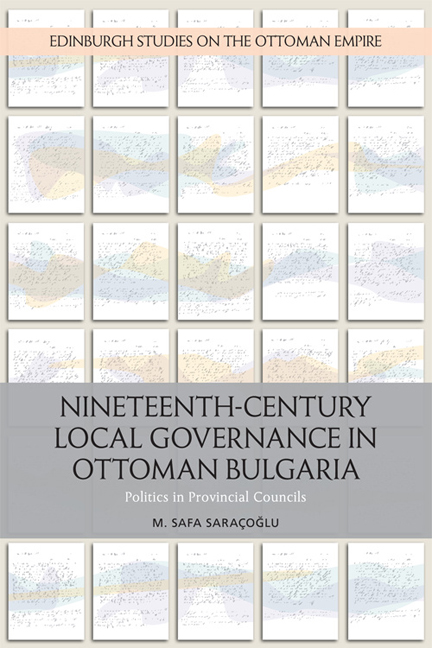Book contents
- Frontmatter
- Contents
- List of Maps, Figures and Tables
- Abbreviations
- Preface
- Map
- 1 Introduction
- 2 Contextualising the Nineteenth Century
- 3 Sitting Together: Local Councils and the Politics of Election in the County of Vidin
- 4 Once Inside the Chamber . . . Participation in the Politics of Local Administration
- 5 Writing Politics: Ottoman Governmentality and the Language of Reports
- 6 ‘Cattle Thieves’: Refugee Settlement, Ottoman Governmentality and Biopolitics
- 7 Conclusion
- Select Bibliography
- Index
3 - Sitting Together: Local Councils and the Politics of Election in the County of Vidin
Published online by Cambridge University Press: 24 April 2021
- Frontmatter
- Contents
- List of Maps, Figures and Tables
- Abbreviations
- Preface
- Map
- 1 Introduction
- 2 Contextualising the Nineteenth Century
- 3 Sitting Together: Local Councils and the Politics of Election in the County of Vidin
- 4 Once Inside the Chamber . . . Participation in the Politics of Local Administration
- 5 Writing Politics: Ottoman Governmentality and the Language of Reports
- 6 ‘Cattle Thieves’: Refugee Settlement, Ottoman Governmentality and Biopolitics
- 7 Conclusion
- Select Bibliography
- Index
Summary
Conventional historians of the Bulgarian national ‘revival’ (vŭzrazhdane, lit. ‘rebirth’) commonly consider the local notables who worked ‘for’ the Ottoman government as an ‘enemy of the people’ (Daskalov 2004: 116). This is not surprising considering that socialist Bulgarian scholarship viewed the Ottoman period as ‘an era of cultural stagnation’ (Buchanan 2007: 45), and until recently, Bulgarian historians rarely treated the Ottoman administration in a dispassionate manner. Instead, they have been dismissive of the nineteenth-century Ottoman modernisation process (Petrov 2006: 39–49). However, this perspective cannot explain the role that some ‘Turkish Muslims’ who were associated with Ottoman provincial administration, such as Ma‘ruf Ağazade Ahmed Beğ of Vidin, played in the autonomous Bulgarian administration after the Ottomans lost control of the region in 1878. From as early as 1864 until the end of Ottoman rule in Vidin, Ahmed Beğ (Figure 3.1) was a council member in the provincial judiciary and administrative structure, the focus of this chapter. Interestingly, in 1879, after the collapse of Ottoman rule, he became a member of the new Bulgarian Constituent Assembly, and in 1883 he was still a municipal council member in Vidin. The provincial judicio-administrative sphere's structure provided a space for Ahmed Beğ and other local notables, including all those listed in Figure 3.1, to remain influential despite their religious differences or the change of rule in Vidin. This coincides with what Toledano (1997: 148; 2007: 26–8, 108) describes as the ‘localisation and Ottomanisation’ of rule in the provinces in the eighteenth century. In fact, even after the elimination of large households, the less-prominent notables retained a significant position in the politics of provincial administration as part of Ottoman governance.
This chapter focuses on the nineteenth-century Ottoman administrative unit liva (or sancak), which is equivalent to a county. I examine the politics of administering such a unit, starting with a general analysis of its structure and moving on to a specific analysis of the local offices within Vidin County. Local agents and appointed officials interact with others by using certain practices in accordance with a set of bureaucratic roles. These political interactions constitute local administration. Imperial rules and regulations determine the idealised forms of such interactions.
- Type
- Chapter
- Information
- Nineteenth Century Local Governance in Ottoman BulgariaPolitics in Provincial Councils, pp. 44 - 80Publisher: Edinburgh University PressPrint publication year: 2018



